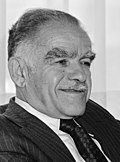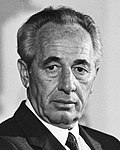Fourth Shamir Cabinet | |
|---|---|
| 24th Cabinet of Israel | |
 | |
| Date formed | 11 June 1990 |
| Date dissolved | 13 July 1992 |
| People and organisations | |
| Head of state | Chaim Herzog |
| Head of government | Yitzhak Shamir |
| Member parties | Likud Tzomet (until 31 December 1991) Shas National Religious Party Moledet (until 21 January 1992) Agudat Yisrael Unity for Peace and Immigration New Liberal Party Geulat Yisrael Degel HaTorah Tehiya (until 21 January 1992) Alignment (one person) |
| Status in legislature | Right-wing Coalition |
| Opposition party | Labor |
| Opposition leader | Shimon Peres |
| History | |
| Legislature term | 12th Knesset |
| Predecessor | 23rd Cabinet of Israel |
| Successor | 25th Cabinet of Israel |
The twenty-fourth government of Israel was formed by Yitzhak Shamir of Likud on 11 June 1990. [1] This followed the failure of Alignment leader Shimon Peres to form a government, after the Alignment had pulled out of the previous national unity coalition, in an incident which became known as the dirty trick.
Contents
Shamir's coalition included Likud, the National Religious Party, Shas, Agudat Yisrael, Degel HaTorah, the New Liberal Party, Tehiya, Tzomet, Moledet, Unity for Peace and Immigration and Geulat Yisrael, and held 62 of the 120 seats in the Knesset. Some authors (including political scientist Clive A. Jones and historians Avi Shlaim and Benny Morris [2] ) later asserted that the 24th government of Israel was the most right-wing government in the country's history. Tehiya, Tzomet and Moledet all left the coalition in late 1991 and early 1992 in protest at Shamir's participation in the Madrid Conference, but the government remained in office until Yitzhak Rabin formed the twenty-fifth government, following the Labor Party's victory in the 1992 elections.
| |||||||||||||||||
| |||||||||||||||||
| |||||||||||||||||

